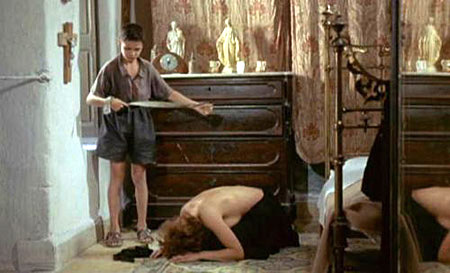
Fernando Arrabal is one of those directors that I’ve been aware of for some time without ever actually experiencing first hand. He’s one of a bunch of filmmakers who spent the early seventies making the kinds of surrealistic films which were extremely popular with the counter-culture of the time, and subsequently established themselves as firm favourites among aficionados of cult cinema over the next twenty years. Less well known than his kindred spirit and collaborator or, as he’d rather have it, ‘non-collaborator’ Alejandro Jodorowsky, his work was pretty hard to see – in the English language speaking world at least – until the DVD era, and it’s only now that a detailed re-evaluation has begun to take place.
Set during some kind of conflict – possibly the Spanish Civil War – Long Live Death, his debut film, follows Fando (Mahdi Chaouch), a young boy whose father has been either imprisoned or killed by the authorities. Subject to frequent erotic fantasies about his Aunt (Anouk Ferjac), he’s encouraged by his mother (Nuria Espert) to wear a cilice as a way of overcoming them, but it doesn’t seem to do much good. Meanwhile, he’s becoming increasingly curious about the circumstances of his father’s arrest, and he gradually becomes convinced that his mother could have had something to do with it.
Amongst all this, though, are interspersed regular fantasy sequences as Fando imagines the tortures that could have been suffered by his father and, as his suspicions of his mother increase, the extremity of her assumed betrayal. Shot using coloured and filtered lenses, these generally involve nudity, extreme violence or just a dash of plain and simple weirdness. Priests cut off their testicles, revolutionaries are shot in their backside, women offer themselves to the very soldiers who are executing their husbands, and so on and so on.
And therein lies the problem with the film. The fantasy sequences are often startling, but there are simply so many of them they lose their impact. By the point at which Fando’s mother excavates her bowels on his father while he’s being held prisoner in a hole in the ground, it all just seems rather amusing. When Long Lives Death was made, this must all have appeared rather extreme, but in subsequent years the vast majority of people have become more resistant to shock.
And the trouble is that these sequences are inserted into the story in a deliberately crude fashion, which causes the pacing to become rather staccato and making the main narrative, such as it is, appear rather unsatisfying. Furthermore, the most shocking sequences – Fando whipping his half naked mother at her bequest, some protracted animal slaughter – actually occur within this ‘real world’ context, as do some of the most arresting images (Fando recovering from tuberculosis on a ship with several other boys suffering from the same condition). Perhaps this is an age thing, and I’m sure that when I was in my late teens I would have been more into the more deliberately surreal aspects, but nowadays couldn’t help but think how little emotional engagement it generates in comparison, say, to Victor Erice’s similarly set and themed The Voice of the Beehive.
But… that’s not to be negative. I can see why this has become a cult favourite, and some of the images that Arrabal conjures certainly stick in the mind. It’s also unusual in that is does actually manage to capture the often dark and macabre inner world of a teenage boy very well, and Fando certainly far from an innocent bambino. The problems with structure are shared with much of the experimental, cut-up literature of the time, and it gains point for keeping the length to a manageable 90 minutes. Whether it actually means anything, though, is an entirely different question.
I watched the DVD from Cult Epics, which is good quality and includes an entertaining interview with Arrabal who is, if you want to be charitable, an eccentric. Or, if you want to be less charitable, you could call him a bullshit artist instead!
Here’s a trailer: